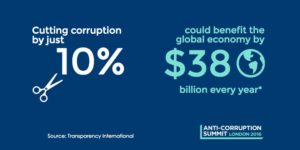16th May 2016 Skopje, North Macedonia
Name me one country where corruption doesn’t exist
Name me one country where corruption doesn’t exist. You can’t, I know. Corruption exists, to a greater or lesser extent, in every country. And that global reach is one of the reasons behind the Anti-Corruption Summit hosted by Prime Minister David Cameron in London on 12 May.
This was no conventional summit limited to Heads of Government. It brought together civil society, international organisations and business, as well as more traditional country representatives. Session chairs included the global head of Transparency International and the President of the International Paralympic Committee. Debate was free-flowing, and live-streamed.
But why all the fuss? The internet has countless articles answering this question, so I won’t go into detail here. Try the corruption blogs on the World Bank site (http://www.worldbank.org/) or the material on www.transparencyinternational.eu. But three points strike me as especially important:
- It is your money! Money that ends up corruptly in some individual’s pocket belongs to you, not to them.
- It damages the economy, making you poorer. Corruption adds to the risk of starting up a business. It puts people off. And the net effect is less competition, fewer jobs and less wealth-generation. Corruption is often the reason why a foreign business decides not to invest in a country.
- It increases bad decision-making by government. Corrupt officials may be encouraged to put public money into low-priority projects which give them an opportunity to take money, instead of into projects that meet the public’s priorities and needs. Think hospitals and schools.
What will the London Anti-Corruption Summit achieve? While all agreed that the Summit was just a start and that much more was needed, it was widely recognised as having been a very good start. Transparency International blogged afterwards that ‘this was a good day in the fight against corruption.’ Prime Minister Cameron set out highlights of the Summit’s achievements in his closing statement. These include: countries committing to public registers of beneficial ownership to increase transparency; a new International Anti-Corruption Coordination Centre to be based in London; stronger protection for whistle-blowers; and better cooperation to share innovative techniques for tackling corruption.
But we shouldn’t leave this to the governments and international organisations. I’ll leave the last word to José Ugas, Chair of Transparency International: ‘Corruption can be beaten if we work together. To stamp out the abuse of power, bribery and shed light on secret deals, citizens must together tell their governments they have had enough.’

